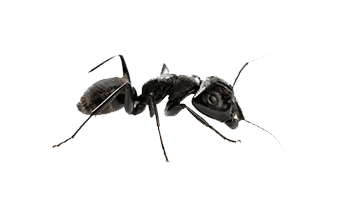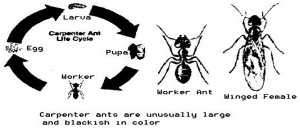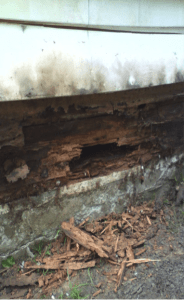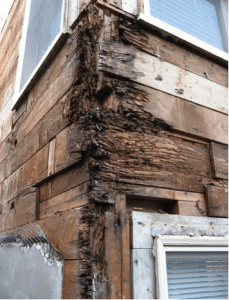Local Carpenter Ant Control And Treatment Services
EnviroPest has been protecting local homes and families for over 30 years. Our carpenter ant exterminators provide a variety of treatments including our all-natural carpenter ant control solutions that effectively deal with your issue without requiring you to leave the comforts of your home for more than a few hours.
Our Industry Leading Carpenter Ant Extermination Method
We Start with a Thorough Investigation
Carpenter ants can be an especially tricky pest, and there is a good chance that your infestation is not confined to one room in your house. Our technicians have the experience and expertise to understand all the possible hiding spots for carpenter ants and thoroughly inspect each possible location.
Our Treatment Tool-Chest
We offer a variety of different treatments for carpenter ant extermination and will provide recommendations on which procedure is right for your pest situation.
We promise you a 100% carpenter ant-free house, and we guarantee it! If you find that some of those pesky bugs managed to get past our initial assault, we will come back and make sure we treat your house again free of charge.

Carpenter Ants - Camponotus pennsylvanicus
Carpenter ants are large black ants that can range in size from 0.3 to 1.0 inches or .076 to 2.54 centimeters. Carpenter ants are indigenous to most of the world’s forests. Carpenter ants infest wooden buildings and structures and are a wide spread nuisance and major cause of structural damage.
Carpenter Ant Lifecycle
The life cycle of carpenter ants begins with the nuptial flight, which usually occurs in the late spring or early summer, depending on environmental factors. During this mating flight, male winged carpenter ants, or swarmers, mate with winged females. Soon after mating, the females shed their wings and the males die. The female ants then search for a new site to build their colonies. The queen typically seeks a small crack in a wooden structure. She then closes herself inside that chamber, and lays the first batch of eggs. The carpenter ant will have 4 stages to complete the life cycle (egg, larva, pupa & worker).The Queen will remains inside the chamber until her first batch of eggs becomes adult workers. It takes three to six years to establish a large and stable colony. The life cycle of a carpenter ant is estimated to be 6 to 12 weeks from egg to adult.

After two or more years, the queen begins to produce winged males and females who will leave to begin other colonies of carpenter ants.
Signs of Carpenter Ant activity
Structural Implications of Carpenter Ants


How To Hire A Carpenter Ant Exterminator
What to look for when choosing a pest control professional for your carpenter ant problem:
- The pest management company should be licensed by the state and insured.
- Carpenter ant exterminators should be certified pest management professionals and fully licensed in the state.
- The company should be a member of a professional organization, such as the National Pest Management Association.
- The company should have a staff entomologist or access to one.
- Technicians should have experience with carpenter ants.
- Choose a company based on their quality of service, not the price. Research user reviews and testimonials to solidify your choice.
- A pre-inspection should be conducted to assess the scope of the work.
- The proposed work should follow the steps of integrated pest management, not just pesticide application.
The EnviroPest Guarantee
Complete Service Guarantee
If at any time between services or your guarantee period, you as a customer of EnviroPest are not satisfied for any reason. We will readdress the area in question at no additional charge. We have serviced over 300,000 homes and businesses over 30 years, and our clients rely on us to stand behind the work we perform.
Our continuous inspection and treatment mean a 100% guarantee as long as you have us on the property.
Our service personnel has been trained and certified with over six (6) years of experience in the pest control field as specialists. We do not advocate or provide seasonal labor or “college kids” to provide applications in or around your family or home. Another reason we are the natural choice in pest control.
Request Free Pest Control Estimate
ASK THE EXTERMINATOR:
Why do I still see carpenter ants after your treatments?
Our treatments are meant to initiate ant movement. The flushing agent in our material is making the ants active, making them track our material. The activity in your home must increase to decrease. By having this happen, you will see more ants after treatments. Activity, especially slow moving lethargic ants, means our treatments are working correctly.
You have treated my dwelling several times. Will I still see ants?
The pest biology includes hatching cycles that take place every 60-90 days, hence the timing of our treatments. As a pest management professional, I cannot terminate the eggs of these pests unless physically found. Therefore, when a hatching cycle does occur, more significant activity will exist. Our materials are active for 60-90 days and take care of your problem if given time for these hatching cycles to occur.
Why is there winter treatment for carpenter ants? I don’t see any ants during the winter?
Throughout the winter months, carpenter ant colonies remain active, and workers continue to forage food and water. Queens continues to lay eggs, and overwintering larvae begin pupating. The ability of these colonies to survive in freezing temperatures remains one of their most vital survival tactics. Consequently, treatment in the winter or early spring can avert a colony growth and the dispersal of fertilized females over the property.
Should I eliminate the carpenter ants I see after you have treated my dwelling?
Please do not eliminate the ants that are actively moving within your dwelling. Our materials are used as a tracking agent, which helps us eliminate a nesting site. Our material gives the ant 4-6 hours to live, which in this time an ant can return to its nest 2-3 times. By eliminating the visible ants, you are disabling them to track our material to their nest. If the situation is unbearable and you must expose the ant, this is understood.
I have been applying store-bought material and ant stations to where I see carpenter ants; should I continue to do so?
Please do not apply any store-bought materials to exposed ants; this will only worsen your situation. Using these materials where ants are seen will only make the ants take another route of travel, thus spreading them to new areas of your dwelling. This will also hurt our treatments by disabling the ants to track our material to their nest.
Is there anything I can do as a customer to keep carpenter ants from infesting my dwelling?
Removing or repairing any locations holding moist, damp wood should be a priority. Proper ventilation of the wood in your home is imperative to keep an infestation from happening again. If you have any stacks of timber or logs resting against your home’s siding, this should be moved away from the house to a new location. Water damaged areas should also be replaced and treated to keep a reoccurring infestation from taking place.
How long should I expect activity to be increased after your treatments?
Many factors contribute to how long you may see increased activity in your dwelling. Such things as weather conditions, the maturity of the colony, time of year, and mating habits are important factors. Generally, your activity will rise high for the first 15-20 days after treatments. After the initial 20 days, the activity will slowly decrease depending on your situation.
Hatching cycles will occur, causing activity to increase again, do not become frustrated for our material will be active and take care of the activity in another 15-20 days.
You can also use the onsite chat feature, Free Pest Control Estimate form on this page, or our online contact form to get in touch with us. Whatever your pest control need, we are happy to help you eliminate it.
Featured Product Lines:

Your technicians were so polite and considerate. They put covers over their boots and wore a mask the entire time. It was a pleasure to have them working in my house. They carefully explained what they would be doing, and when they finished, they explained what they had done. I would be happy to have them come again!



